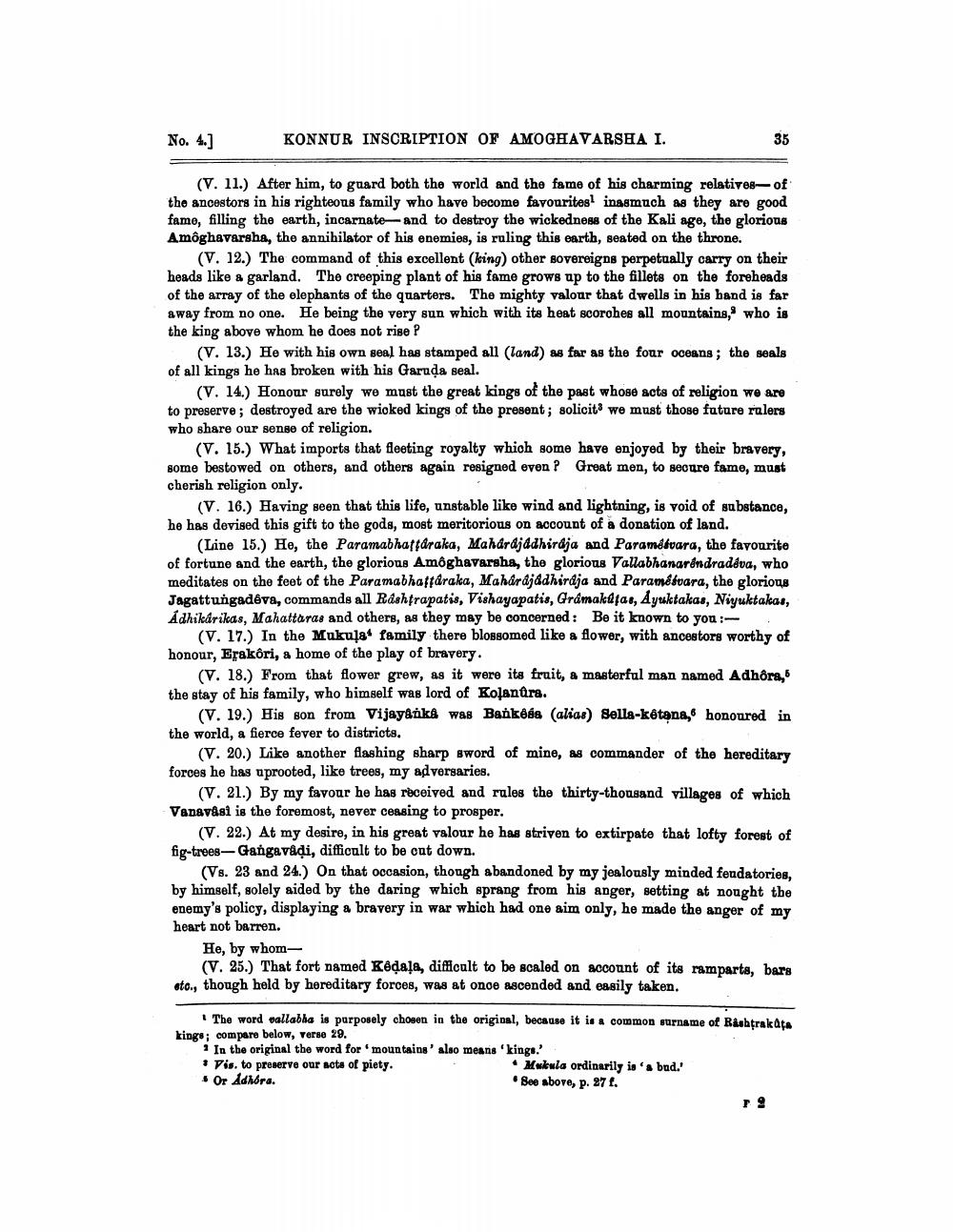________________
No. 4.]
KONNUR INSCRIPTION OF AMOGHAVARSHA I.
(V. 11.) After him, to guard both the world and the fame of his charming relatives-of the ancestors in his righteous family who have become favourites inasmuch as they are good fame, filling the earth, incarnate and to destroy the wickedness of the Kali age, the glorious Amôghavarsha, the annihilator of his enemies, is ruling this earth, seated on the throne.
(V. 12.) The command of this excellent (king) other sovereigns perpetually carry on their heads like a garland. The creeping plant of his fame grows up to the fillets on the foreheads of the array of the elephants of the quarters. The mighty valour that dwells in his band is far away from no one. He being the very sun which with its heat scorches all mountains, who is the king above whom he does not rise ?
(V. 13.) He with his own seal has stamped all (land) as far as the four oceans; the seals of all kings he has broken with his Garuda seal.
(V. 14.) Honour gurely we must the great kings of the past whose acts of religion we are to preserve; destroyed are the wioked kings of the present; solicit: we must those future rulers who share our sense of religion.
(V. 15.) What imports that fleeting royalty which some have enjoyed by their bravery, some bestowed on others, and others again resigned even ? Great men, to secure fame, must cherish religion only.
(V. 16.) Having seen that this life, unstable like wind and lightning, is void of substance, he has devised this gift to the gods, most meritorious on account of a donation of land.
(Line 15.) He, the Paramabhattaraka, Maharajadhiraja and Paramétuara, the favourite of fortune and the earth, the glorious Amoghavarsha, the glorious Vallabhanarendraddva, who meditates on the feet of the Paramabhaftáraka, Maharajadhirdja and Paramstvara, the glorious Jagattungadeva, commands all Rashtrapatis, Vishayapatis, Grámakdfas, Ayuktakas, Niyuktakas, Adhikarikas, Mahattaras and others, as they may be concerned: Be it known to you:
(V. 17.) In the Mukula family there blossomed like a flower, with ancestors worthy of honour, Erakori, a home of the play of bravery.
(V. 18.) From that flower grew, as it were its fruit, & masterful man named Adhôra, the stay of his family, who himself was lord of Kolantra.
(V. 19.) His son from Vijay&nks was Bankess (alias) Sella-kêtana,honoured in the world, a fierce fever to districts.
(V. 20.) Like another flashing sharp sword of mine, as commander of the hereditary forces he has uprooted, like trees, my adversaries.
(V. 21.) By my favour he has received and rules the thirty-thousand villages of which Vanavasi is the foremost, never ceasing to prosper.
(V. 22.) At my desire, in his great valour he has striven to extirpate that lofty forest of fig-trees- Gangavådi, difficult to be cut down.
(Vs. 23 and 24.) On that occasion, though abandoned by my jealously minded fendatories, by himself, solely aided by the daring which sprang from his anger, setting at nought the enemy's policy, displaying a bravery in war which had one aim only, he made the anger of my heart not barren.
He, by whom
(V. 25.) That fort named Kodaļa, difficult to be scaled on account of its ramparts, bars ato., though held by hereditary forces, was at once ascended and easily taken.
The word vallabha is parposely chosen in the original, because it is a common surname of Rashtrakata kings; compare below, verse 29.
In the original the word for mountains also means 'kings.' . Vis. to preserve our acts of piety.
• Mukula ordinarily is' bad.' · Or Adhóra.
. See above, p. 27 f.




